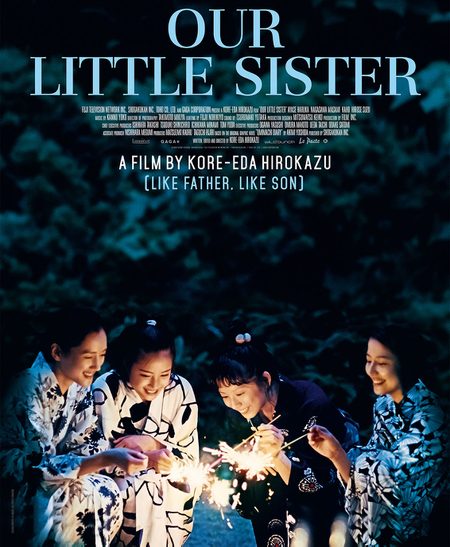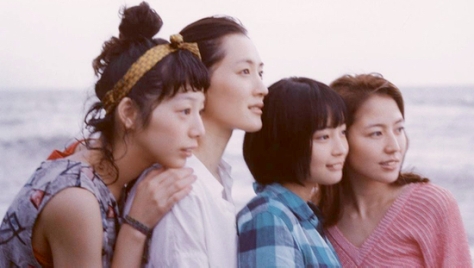Though running 128 minutes Koreeda Hirokazu’s 2015 adaptation of a manga as海街diary (Umimachi Diary, or Seaside-town diary”), released in English as “Our Little Sister” seems slight to me. Many find it “heart-warming,” I find it sentimental in a Kinoshita tradition. Three sisters: 29-year-old Sachi (Ayase Haruka), 22-year-old Yoshino a (Nagasawa Masami) and 19-year-old Chika (Kaho) live in a large house in Kamakura (southeast of Tokyo). News comes that their father, whom they have not seen in 15 years, has died. They go to the funeral, where their father’s third wife claims to have nursed their father through his final illness.

They intuit that the serious-looking 14-year-old Asano Suzu (Hirose Suzu) was the one who cared for their father. Sachi invites Suzu to come and live with them rather than stay with her/their stepmother. Suzu was the offspring of the woman with whom their father decamped, his second wife.
Suzu is keenly aware that she is a very visible reminder of their common father abandoning his first wife and their three daughters. She is especially aware of her negative connections for the mother of the three older females, who also abandoned her three daughters and drops in. Sachi, who was left to raise her younger two sisters, is very antagonistic to her mother, though the immature woman tries to make Suzu comfortable in her presence.

Though the sisters experience frustration in their own love lives, there is no antagonism or even tension between any of them, and they all dote on Suzu. Suzu makes the coeducational soccer team and hangs out with one of the male players and is dutiful and grateful at her new home. Tensions are mostly between generations not between siblings (and the novel half-sibling who is something of a pet, but also arguably more mature than Chika).
Ayase Haruka, who strikes me as the most beautiful of the women in the cast, is self-sacrificing in the manner of Takamine Hideko in 1950s family dramas made by Ozu and Kinoshita. The offspring are old enough to make money in contrast to the young children huddling together in Koreeda’s 2004 “Nobody Knows,” which lessens the drama and the poignancy. Suzu not only can go to school, but fits in readily. Still, the actresses (including three of the older generation) are very good in what seems like a very gentle, muted, episodic sitcom that mostly takes place in the family house‑though when it does go out, things are beautifully photographed by Mikya Takimoto, who also shot “Like Father, Like Son” for Koreeda.
©2017, Stephen O. Murray